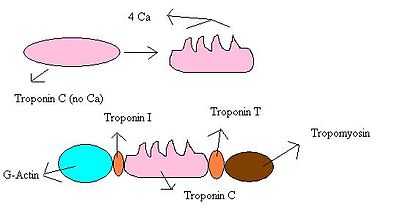Troponin T

Troponin T is a part of the troponin complex. It binds to tropomyosin, interlocking them to form a troponin-tropomyosin complex.
The tissue-specific subtypes are:
- Slow skeletal troponin T1, TNNT1 (19q13.4, 191041)
- Cardiac troponin T2, TNNT2 (1q32, 191045)
- Fast skeletal troponin T3, TNNT3 (11p15.5, 600692)
Troponin T binds to tropomyosin and helps position it on actin,[1] and with the rest of the troponin complex modulates contraction of striated muscle.[2]
Troponin T was discovered by the German physician Hugo A. Katus at the University of Heidelberg. He also developed the troponin T assay.[3]
In patients with stable coronary artery disease, troponin T concentrations have been found to be significantly associated with the incidence of cardiovascular death and heart failure, but it was March of 2014 (when one study, at the Swedish Karolinska Institute, not yet formally reported in a journal, showed that high-sensitivity cardiac troponin T, did have some predictive power in telling which patients with chest pain would be at risk) before it began to be accepted in predicting who would go on to suffer acute myocardial infarction (heart attack).[4][5]
Reference Values
The upper limit of Troponin T for normal individuals is <0.01 ng/mL. Values > or =0.01 ng/mL have been shown to have prognostic value.
References
- ↑ marieb, elaine (2004)
- ↑ black, joyce (2005)
- ↑ "Development of the Cardiac Troponin T Immunoassay". American Association for Clinical Chemistry, Inc. 2008. Retrieved 2010-05-01.
- ↑ "A Sensitive Cardiac Troponin T Assay in Stable Coronary Artery Disease". New England Journal of Medicine. 2009. Retrieved 2012-04-04.
- ↑ http://healthyliving.msn.com/diseases/heart-and-cardiovascular/blood-test-shows-promise-for-gauging-heart-attack-risk-after-chest-pain
See also
External links
- Troponin T at the US National Library of Medicine Medical Subject Headings (MeSH)
| ||||||||||||||||||||||||||||||||||||||||||||||||||||||||||||||||||||||||||||||||||||
| ||||||||||||||||||||||||||||||||||||||||||||||||||||||||||||||||||||||||||||||||||||||||||||||||||||